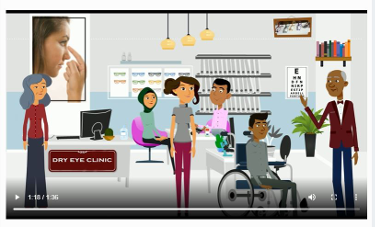Eye makeup and skin care used in and around the eyes is a potential source of irritation, inflammation, infection, allergy and possibly adverse permanant changes to eye health. As just one example out of many aspects of eye cosmetics Amy Gallant Sullivan, Creator of 'Èyes Are The Story' highlights eyelash extensions; "eyelash extensions aren’t always pretty, lash extensions can cause irritation, conjunctivitis, keratitis, and even severe allergic reactions. False eyelashes can promote the risk of bacterial & fungal infection. Eyelash extensions can even cause eyelash loss! Watch the video for more information on lash extension.
You will find the Eyes Are The Story web site here.
Kathyrn Chidwick BSc(Hons) Ophthalmic Dispensing, in a recent article in Re:View the ABDO College journal, discussed the possible contamination and infections from ocular cosmetics. Her critical research analysis found studies that revealed high contamination of ocular cosmetic products being used by patients with potential sight-threatning bacteria and fungi. It is strongly advisable for ocular cosmetics not to be shared or used past their expiry date.
The same research analysis found studies showing eye liner can destabilise the tear film and block the vital meibomian glands in the eye lid. Many skin-care products contain retinoids, these may cause or excerbate meibomian gland dysfunction.
Alllergic reactions to the multitude of chemicals found in ocular cosmetics have been known for many years, even leading to a dermatitis condition on the eye lids, from the ocular cosmetics themselves, or hair products.
The complete article can be found in the December 2021 issue of Re:View .
Application
Never apply eye makeup over the oil glands that line the very edge of your upper and lower lids, just inside the eyelash line. These are the glands that secrete oils to keep the eye lubricated. If you need to use an eye drop, apply it 15-30 minutes before putting on your makeup.
Removal
Makeup Hygiene
Makeup Type
Find Alternatives
If you suffer from severe and chronic dry eye and are intolerant of eye makeup try highlighting other aspects of you face, such as your lips and cheeks, which allows you to highlight your natural beauty without ever touching your eyes.
Eyelash extensions
These have grown in popularity due to beauty trends favoring the appearance of more robust eyelashes and eyebrows. Eyelash extensions are synthetic fibers (e.g. polyester) that are applied on the natural lashes using glue that may contain chemicals such as formaldehyde, lead, and benzoic acid. Allergic reactions to eyelash glue can be serious as well as associated complications including keratoconjunctivits, contact dermatis and blepharitis, conjunctival and corneal erosion, subconjunctival hemorrhage. To prevent complications arising from eyelash extensions, both the patients and the beauty industry should learn the potential complications of the procedure and the ingredients of the glue and lash removers should be strictly regulated and monitored.
Yes, it is possible. Many general health conditions have a role in dry eye and/or blepharitis. At your Dry Eye Assessment we will want to know about your general health and health conditions/treatments you have had in the past. We believe it is simply not possible to address your dry eye condition and best help you without knowing this information. Just as one example, rheumatoid arthritis or other types of inflammatory disease are a risk factor in dry eye disease, so if that is the case we would want to manage it specifically, another good reason why self-treatment with self-selected eye drops is not advised.
Yes, it is possible. Many general and eye medications and the conditions they are taken for can exacerbate the general condition called dry eye. At your Dry Eye Assessment we will want to know your medications, food supplements and ask about your diet, do you eat oily fish for instance. We believe it is simply not possible to address your dry eye condition and best help you without knowing this information. Importantly we very rarely advocate a medication change but rather work with your medication prescriber to manage your dry eye condition, certainly you should not change medication in any way without consulting your doctor or pharmacist.
On an allied point there are available specific dry eye food supplements with evidence of effectiveness available, but these are contra-indicated if you are taking certain medications or other food supplements, we will advise you at your Dry Eye Assessments.
As in the ‘hot flannels’ question, this advice, although well meaning, is not based on any evidence of its effectiveness. In fact there is evidence that it can adversely affect vital glands on the eye surface that contribute to good quality tears. It also has a detergent effect, which actually beaks up the tear film. Its use has never been proposed by the manufacturers of such a product, and recently a well-known global producer of ‘baby shampoo’ officially wrote to an UK ophthalmologist strongly supporting his advice against its use.
VIDEO HERE
If this was the question in 1975, perhaps so, if only because we didn’t understand the complexity of the eye lids or the tears then and we had nothing better. This approach was neither safe (risk of it being too hot and/or very unhygienic) or effective (the required heat is not maintained for nowhere near long enough). In 2020, with our much better understanding of the ocular surface, lids and tears we know much better. Heat application alone is not usually sufficient to help one of the types of dry eye (the type of dry eye needs to identified correctly) most Eye Care Professionals, who understand dry eye/blepharitis would not advocate their use.
Yes, most glaucoma drops have preservatives within them to protect against contamination. Very often the continued application of these very necessary drops, with their preservatives, to the eye can cause eye surface inflammation and irritation.
Many of the same age group of patients using glaucoma drops are predisposed to dry eye, these two factors (preservatives and dry eye) often mean the eye is not comfortable.
The answer is NOT to stop using the glaucoma drops, they are vital, it may well be, after a specific Dry Eye Assessment, the dry eye and effects of the glaucoma drops can be managed better, leading to the eyes being more comfortable and, evidence has shown, the glaucoma drops being more effective.
Although a few specific dry eye drops have very sophisticated formulations, even they don’t have ability to stay on the eye’s surface for many hours. Most dry eye drops, with more basic components, will have only have an effect for one or two hours.
The answer, in many cases, following a specific Dry Eye Assessment and diagnosis (there are different types of dry eye) is to treat the eye’s surface in addition to the use of very particular drops. Once the particular cause is identified in the exam, targeted therapy can be advised, sometimes aided by in-practice treatment. The very good news is that this approach gives me, and more importantly, my patients a 95% success rate!



